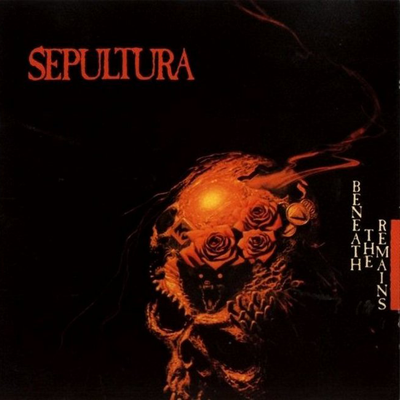
SEPULTURA, Beneath the Remains (1989, Roadrunner)
The skull:
When this album was released, it sat on record store shelves looking utterly innovative. The cover design may not seem so interesting nowadays, but back then it didn’t look like the rest. No big gaudy metal logo, the vertically-written album title with that curious red bar added arty nuance. The off-center picture surrounded by all that black lent a stark quality to the cover, and the skull itself was so surrealisticly adorned that the whole thing just looked remarkably different than your average death or thrash metal album cover of the era. The Michael Whelan skull is a beaut, its downcast gaze nearly falling off the edge of the album cover, carrying on its head roses, a wombat (I suppose), a graveyard, miscellaneous medallions, and a hole in its head that seeps wispy trails of smoke. This skull has a lot on its mind. Seriously, folks, this is one of the finest skull covers in the Skullection, at least as serious, non-humourous skull covers go.
The music:
After Sepultura’s deliciously crude early recordings and the transitional raw thrash of Schizophrenia, these Brazilians emerged as masters of the death/thrash craft with Beneath the Remains. Incredibly tight, frantic, semi-technical, dark and overflowing with top-notch riffs, there isn’t a finer example of the early merger of death and thrash metal than this. While it’s not perfect (“Sarcastic Existence” and “Lobotomy” don’t resonate with memorable highlights like the rest), it’s way better than most albums by most bands. Everything Schizophrenia attempted to reach and only got halfway toward is successfully achieved here. Sepultura had honed their sound into something with more definition and power than the band they had been prior to this. Beneath the Remains rightfully deserves its place as a classic. If songs such as the title track, “Inner Self,” “Mass Hypnosis” and “Slaves of Pain” aren’t immediately familiar, your metal diet is lacking in an essential, life-giving nutrient. There’s no need to review this masterpiece further. You either love it or you’re living a life of deprivation.
— Friar Wagner